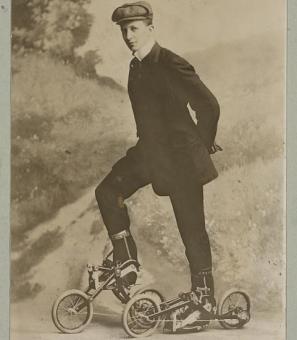Impressions of Washington: Sarah Pryor, 1859 - 1861
Sarah Pryor (1830-1912), the daughter of a wealthy Virginian family, lived in Washington from 1859 until the outbreak of the Civil War. In her memoirs written in 1909, she recounts the grand society of antebellum D.C. and the shift to war tensions.
On her earliest memories of Washington
Washington was like a great village in the days of President Pierce and President Buchanan…. my heart would swell within me at every glimpse of the Capitol: from the moment it rose like a white cloud above the smoke and mists… the moment when a point on the unfinished dome glowed like a great blazing star after the sun had really gone down. No matter whether suns rose or set, there was the star of our country - the star of our hearts and hopes.
On the House and the Senate
The honor of pointing out the great men to our friends from rural districts; the long listening to interminable speeches, not clearly understood, but heard with a reverent conviction that all was coming out right in the end, that everybody was really working for the good of his country, and that we belonged to it all and were parts of it all.
On weather in the capital city
This was the thought behind all other thoughts which glorified everything around us… and caused us to ignore the real discomforts of life in Washington: the cold, the ice-laden streets in winter; the whirlwinds of dust and driving rains of spring; the swift-coming fierceness of summer heat; the rapid atmospheric changes which would give us all these extremes in one week, or even one day, until it became the part of prudence never to sally forth on any expedition without “a fan, an overcoat, and an umbrella.”
On Washington society
The social life in Washington was almost as variable as the climate. At the end of every four years the kaleidoscope turned, and lo!- a new central jewel and new colors and combinations in the setting.
But behind these “floating populations,” as the political circles were termed, there was a fine society in the fifties of “old residents” who held themselves apart from the motley crowd of office-seekers. This society was sufficient to itself, never seeking the new, while accepting it occasionally with discretion, reservations, and much discriminating care. The sisters, Mrs. Gales and Mrs. Seaton, wives of the editors of the National Intelligencer, led this society… Mrs. Gales … was literally her husband’s right hand- he had lost his own- and was the only person who could decipher his left-hand writing. So that when anything appeared from his pen, it had been copied by his wife before it reached the type-setting.
A fine education this for an intelligent woman; the very best schooling for a social life including diplomats from foreign countries, politicians of diverse opinions, artists, authors, musicians, women of fashion, to entertain whom required infinite tact, cleverness, and an intimate acquaintance with the absorbing questions of the day.
Of course, the levees and state receptions, which were accessible to all, required none of these things. The role of hostess on state occasions could be filled creditably by any woman of ordinary physical strength, patience, self-control, who knew when to be silent.
Washington society, at the time of which I write, was comparatively free from non-official men of wealth from other cities who… are attracted by the unique atmosphere of a city holding many foreigners… Society in Washington in the fifties was peculiarly interesting in that it was composed exclusively of men of importance at home. They have been elected by the people, or chosen by the President, or selected among the very best in foreign countries, or they belong to the United States Army or Navy service, or to the descendants of the select society which had gathered in the city early in its history.
Rules of social life, as related by an older resident
“…You cannot always have your husband to attend you. It will be altogether proper for you to go with your sister to morning and afternoon receptions. When you arrive, send for the host or the master of ceremonies, and he will take you in and present you. Of course, your husband will take you to balls; if he is busy, you simply cannot go! I think you would do well to make a rule never, under any circumstances, to drive in men's carriages. There are so many foreigners here, you must be careful. They never bring their own court manners to Washington. They take their cue from the people they meet. If you are high and haughty, they will be high and haughty. If you are genially civil but reserved, they will be so. If you talk personalities in a free and easy way, they will spring some audacious piece of scandal on you, and the Lord only knows where they'll end."
On the arrival of the first Japanese Embassy
Washington lost its head! There was something ridiculous in the way it behaved. So many fêtes were given to the Japanese, so many dinners, so many receptions, we were worn out attending them. "I don't know what we have come here for," said one senator to another; "there's nothing whatever done at the House." "I know," his friend replied; "we came here to wait on the Japanese at table."
On increasing tensions between North and South
…Memory lingers upon the delightful friends who made my Washington life beautiful… Even after social lines were strictly drawn between North and South, I had the good fortune to retain my Northern friends. All this I love to remember and would enjoy writing all over again, were it possible twice to give time to social records. Nor can I pause to do more than hint at the spirit of the Thirty-sixth Congress, the struggles, vituperation, intemperate speech, honest efforts of the wise members.
On the speeches given at this time in Congress
Thoroughly alarmed, the women of Washington thronged the galleries of the House and the Senate-chamber. From morning until the hour of adjournment we would sit spellbound, as one after another drew the lurid picture of disunion and war.
On the feeling in Washington after South Carolina seceded from the Union
Apprehension was felt lest the new President's inaugural might be the occasion of rioting, if not of violence. We Southerners were advised to send women and children out of the city.
…We bade adieu to the bright days,—the balls (sometimes three in one evening), the round of visits, the levees, the charming "at homes." The setting sun of such a day should pillow itself on golden clouds, bright harbingers of a morning of beauty and happiness. Alas, alas! "Whom the gods destroy they first infatuate."
Sarah Pryor and her family never returned to Washington, D.C. They participated in the war in Virginia and moved to New York when the fighting was over. Pryor was committed to preserving the past, helping to found the Mary Washington Memorial Association, the Daughters of the American Revolution, the National Society of the Colonial Dames of America, and what is now known as Preservation Virginia.
Sources:
Garraty, John A. and Mark C. Carnes, eds., American National Biography, New York: Oxford University Press, 1999.
Pryor, Sara Agnes Rice. “My Day: Reminiscences of a Long Life.” New York: The Machmillan Company, 1909. Documenting the American South. Web.


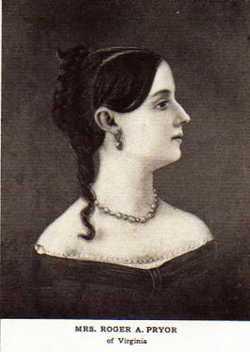
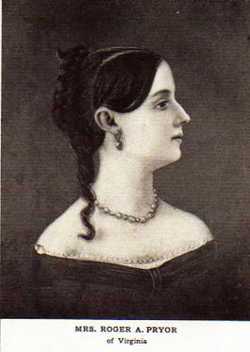
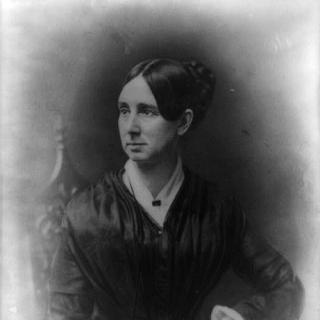
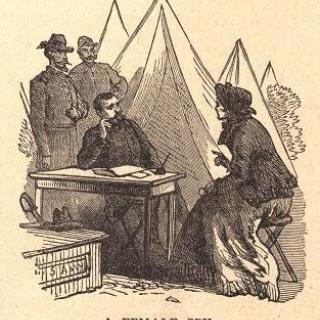
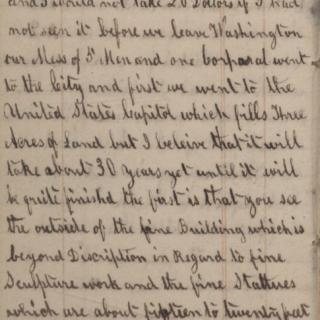
![Sketch of the mythical fuan by Pearson Scott Foresman. [Source: Wikipedia]](/sites/default/files/styles/crop_320x320/public/2023-10/Goatman_Wikipedia_Faun_2_%28PSF%29.png?h=64a074ff&itok=C9Qh-PE1)











